External links
- Jutta Richter in the German National Library catalogue
- Official website by Jutta Richter
- Jutta Richter in: NRW Literatur im Netz (in German)
Jutta Richter | |
|---|---|
| Born | 30 September 1955 |
| Nationality | German |
| Occupation | Author |
| Partner(s) | Rald Thenior |
| Website | http://www.juttarichter.de/ |
Jutta Richter (born 30 September 1955 in Burgsteinfurt, Westfalen, Germany) is a German author of children's and youth literature.
Richter spent her youth in the Ruhr and Sauerland and at the age of 15 she spent a year in Detroit (USA). There she wrote her first book, so as not to forget her native language, and published the book whilst still a schoolgirl.
After studying Theology, German and Communication in Münster she has worked since 1978 as a freelance writer at Schloss Westerwinkel in Ascheberg and in Lucca (Tuscany).
Jutta Richter married the German author Ralf Thenior.

Reinhard Friedrich Michael Mey is a German "Liedermacher". In France he is known as Frédérik Mey.
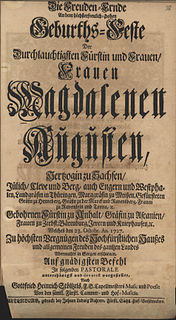
Gottfried Heinrich Stölzel was a prolific German composer of the Baroque era. Stölzel was an accomplished German stylist who wrote a good many of the poetic texts for his vocal works.

Sibylle Berg is a Swiss author and playwright. She writes novels, essays, short fiction, plays, radio plays, and columns.
The Deutscher Jugendliteraturpreis is an annual award established in 1956 by the Federal Ministry of Family Affairs, Senior Citizens, Women and Youth to recognise outstanding works of children's and young adult literature. It is Germany's only state-funded literary award. In the past, authors from many countries have been recognised, including non-German speakers.
Erhard Wittek, better known for his pen name Fritz Steuben, was a German author who wrote war novels and stories depicting American Indians. Steuben wrote war novels based on personal experiences in World War I and other novels under his birth name.
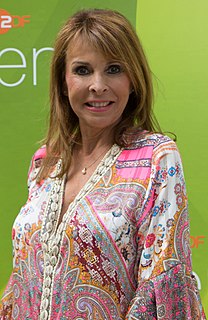
Ireen Sheer is a German-British pop singer. She had a top five hit on the German singles chart with "Goodbye Mama" in 1973. She went on to finish fourth at the Eurovision Song Contest 1974 representing Luxembourg, sixth at the Eurovision Song Contest 1978 representing Germany, and 13th for Luxembourg in 1985.

Günter Kunert was a German writer. Based in East Berlin, he published poetry from 1947, supported by Bertold Brecht. After he had signed a petition against the deprivation of the citizenship of Wolf Biermann in 1976, he lost his SED membership, and moved to the West two years later. He is regarded as a versatile German writer who wrote short stories, essays, autobiographical works, film scripts and novels. He received international honorary doctorates and awards.

The Symphony No. 8 "Lieder der Vergänglichkeit" by Krzysztof Penderecki is a choral symphony in twelve relatively short movements set to 19th and early 20th-century German poems. The work was completed and premiered in 2005. The symphony has an approximate duration of 35 minutes. Penderecki revised the symphony in 2007 by adding a few more poem settings and the piece has expanded to around 50 minutes. Although given the designation Symphony No. 8, it was not actually the final symphony Penderecki completed before his death in March 2020; the Sixth Symphony, begun in 2008, was not completed until 2017.
Dimitar Janakiew Inkiow was a Bulgarian writer.
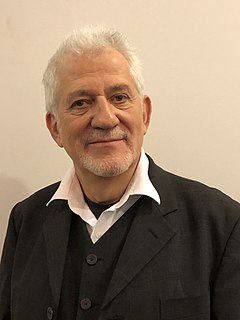
Ilja Richter is a German actor, voice actor, television presenter, singer, theatre director and author.
Erwin Moser was an Austrian children's and young adult books' author and illustrator. He is best known for his children's book series Manuel & Didi, which he illustrated himself, using a text comics format.
Franz Schubert's best-known music for the theatre is his incidental music for Rosamunde. Less successful were his many Opera and Singspiel projects. On the other hand, some of his most popular Lieder, like "Gretchen am Spinnrade," were based on texts written for the theatre.

"Nun freut euch, lieben Christen g'mein" is a Lutheran hymn, written in 1523 by Martin Luther. One of his early hymns, it was published as one of eight songs in 1524 in the first Lutheran hymnal, the Achtliederbuch, which contained four songs by Luther, three by Speratus, and one by Justus Jonas. It appeared also in 1524 in the Erfurt Enchiridion.
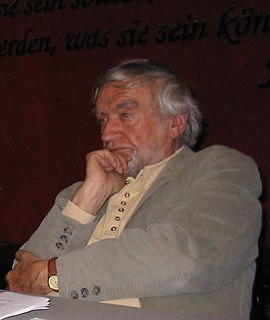
Gerhard Zwerenz was a German writer and politician. From 1994 until 1998 he was a member of the Bundestag for the Party of Democratic Socialism (PDS).
Bach's first cantata cycle refers to the church cantatas Johann Sebastian Bach composed for the somewhat less than 60 occasions of the liturgical year of his first year as Thomaskantor in Leipzig which required concerted music. That year ran from the first Sunday after Trinity in 1723 to Trinity Sunday of the next year:

Der Graf von Gleichen D 918 is an unfinished 1827 opera in two acts by Franz Schubert after a libretto by Eduard Bauernfeld.
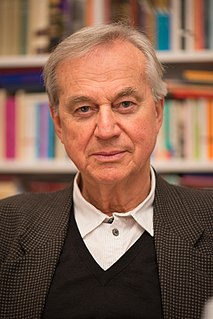
Peter Hamm was a German poet, author, journalist, editor, and literary critic. He wrote several documentaries, including ones about Ingeborg Bachmann and Peter Handke. He wrote for the German weekly newspapers Der Spiegel and Die Zeit, among others. From 1964 to 2002, Hamm worked as contributing editor for culture for the broadcaster Bayerischer Rundfunk. He was also a jury member of literary prizes, and critic for a regular literary club of the Swiss television company Schweizer Fernsehen.

Miguel Herz-Kestranek is an Austrian actor and author.